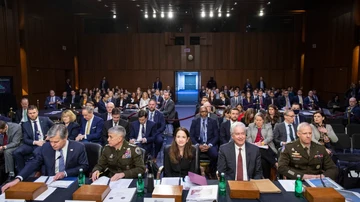Washington does not believe that Russia will achieve great territorial advances in Ukraine this year. It has been assured by the head of the intelligence services of the United States, Avril Haines, in an appearance in the Senate this Wednesday. He has declared that from now on it will be a grueling and attritional war and he does not believe that the Russian army can recover from its losses in the Ukraine.
However, he does not consider the war won for either side since he considers that neither party has a definitive military advantage, and we will have to wait and see how the coming months develop.
What has he said about Ukraine? It could retake significant amounts of occupied land in its planned counteroffensive this spring, but Haines says that will depend on multiple factors, including the loss of Ukrainian troops and equipment to resist Russian attacks.
- NATO Secretary General, Jens Stoltenberghas warned that the city of bakhmut, long under siege, could fall in a few days. However, Haines has described the increasing Russian advances in Bakhmut but ensures that this city is not a particularly strategic objective.
- Ukrainian forces are still locked in a fight to defend themselves against Russian offensives in eastern Ukraine. And he says that while these assaults are costly for Russia, as Ukrainian forces reduce their reserves and equipment, as well as suffer more casualties, it will influence Ukraine’s ability to go on the offensive this spring.

The appearance of the directors of the main US intelligence services in the Senate. | PA
A weakened Russia. The head of US intelligence has given the keys why Russia is now in a more complicated situation. Mo can maintain his current level of fighting in the Ukraine so it’s very likely that he won’t make big gains on territory this year.
- He declassified intelligence reportpublished as Haines and other officials testified, warns that Moscow will become even more dependent on nuclear weapons and capabilitiescyber, and space forces as it will deal extensive damage to Russia’s ground forces.
- Military constraints: personnel and ammunition shortages, dysfunction in the military leadership, burnout, morale problems, and high casualties. Moscow’s military power is now significantly constrained by depletion of weapons and an inability to manufacture more due to trade restrictions and sanctions imposed by the United States and its allies.
- In addition, they point out that the Russian army would have a very difficult time recovering from its losses in Ukraine, so it is possible that the Russians will dedicate themselves completely to holding and defending the territories they now occupy.
- And they say that Russian President Vladimir Putin would now be focused on more modest military objectives. He is likely to prolong the war, with intermittent lulls in fighting, as Haines says “may be the best path left for him to finally secure Russian strategic interests in Ukraine, even if it takes years.”
The other face. Avril Haines and other US intelligence leaders have warned that Russia is leaning more heavily on China, a relationship that continues to deepen, though they do not believe they will become as strong allies as NATO allies.
- And he adds an assessment of Beijing’s position, which he believes benefits more from avoiding a spiral of tensions and preserving stability in its relationship with the United States.
- US intelligence agencies also see signs that Russia and China are working, though not necessarily together, to weaken democracies around the world.
You want to know more? Also the head of Lithuanian military intelligence, Elegius Paulaviciushas assured that Russia has sufficient resources to continue the war in Ukraine with the current intensity for two years, although this duration will depend on the support that the Russian army receives from countries such as Iran or North Korea.
Source: Lasexta
Ricardo is a renowned author and journalist, known for his exceptional writing on top-news stories. He currently works as a writer at the 247 News Agency, where he is known for his ability to deliver breaking news and insightful analysis on the most pressing issues of the day.












